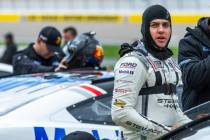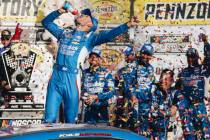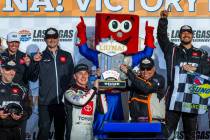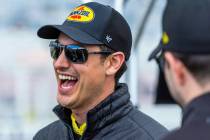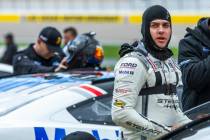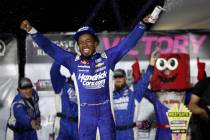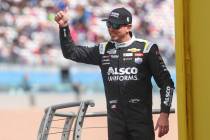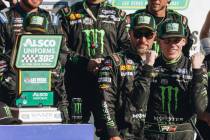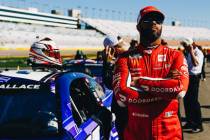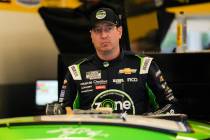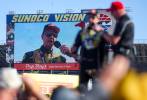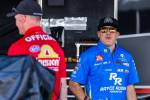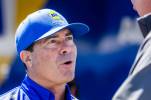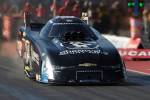Camaraderie helps set drag racing apart
Drag racing is the quickest and fastest form of racing.
Best of all, there are no caution flags.
Unlike stock-car drivers, drag racers rarely run into each other, and on rare occasions when they do, it certainly isn't intentional.
No rattling another drag racer's cage by slamming into his rear bumper or using the "chrome horn" like in NASCAR.
You won't find a dent in a race car at Las Vegas Motor Speedway's dragstrip. At the speedway's Bullring, it's hard to find one that doesn't have remnants of a smashup.
The coolest aspect of drag racing, other than speed and horsepower, is sportsmanship and camaraderie.
And that never was more evident than during the final race of the Jerry's Nugget Drag Racing Series at the speedway a few weeks ago.
The series is mostly for Southern Nevada racers, but the quality of the dragstrip and its programs regularly draw drivers from Utah, Arizona and Southern California.
On Sept. 13, one drag racer's night went from disappointment to elation because of sportsmanship.
Las Vegan John Dowd, a 47-year-old estimator and project manager for Cobra/Executive Plastering, had been the dominant driver this year in the Super Pro division. He arrived at the speedway with a 23-point lead. His fiberglass-bodied 1997 Firebird with racing chassis and major league horsepower routinely hits 160 mph and completes a race in about 8.45 seconds.
Dowd nearly won the title in the series' top category a year ago, but a mechanical problem on the final night led to a runner-up finish.
This year he was the class of the field, consistently went deep in elimination rounds and won two titles. The Super Pro title was his to lose. Glen Copley of Las Vegas and his wicked-fast custom 1968 Camaro was the only driver with a chance to catch him.
On Dowd's first practice run, his pride and joy wouldn't hold an idle. It stalled and was towed back to his pit, where Dowd found an electrical problem. He needed a new ignition box.
Several competitors -- including Copley -- helped work on the car and tried to find one for him.
Dowd's car was in pieces when a replacement ignition was found, but it was too late for him to make repairs.
"I didn't want to see John go down like that," Copley said of why he helped Dowd and perhaps ended his own championship hopes. "We're like a big family out there."
Said Dowd: "I thought that was the end of my chance to win the championship."
That's when Don Kruse offered to let Dowd drive his 1995 Chevy Beretta hot rod.
"My first thought was to say no," Dowd said. "Don was 12th in points and could have made the top 10.
"I hesitated until I thought how much I wanted to win a championship. It was awesome for Don to do that."
Now Dowd had a race car and his dreams were alive, but he still had to win at least one round in eliminations. And driving a 160 mph race car for the first time isn't like borrowing your neighbor's sedan for a run to the store.
Kruse's car is fast -- about 155 mph in the quarter mile -- but the control panel on the dash is laid out differently than Dowd's. Dowd had only one practice run to become acclimated.
He beat Copley in the first round for the championship and earned a $2,500 bonus and advanced to the final round before losing. "It isn't so much about the money," Dowd said. "It's the championship."
Copley had no complaints about placing second to Dowd. "John had a great year and deserved it. The right guy won the championship," he said.
And the right guy has the right friends and competes in the right form of racing.
Jeff Wolf's motor sports column is published Friday. He can be reached at 383-0247 or jwolf@reviewjournal.com. Visit Wolf's motor sports blog at lvrj.com.








